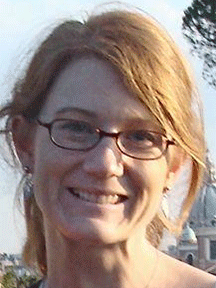By Rachel Lewis
Lela Urquhart, Assistant Professor at Georgia State University, is the winner of the 2013 Mary Isabel Sibley Fellowship in Greek Studies. She is using the Sibley Fellowship and its $20,000 stipend to complete her book, “Colonization, Religion and State Formation in the Archaic West Mediterranean.”
Building on the dissertation research she completed in 2010, Urquhart is seeking to understand the connection between religious, social, and political changes that occurred in the west Mediterranean upon colonization in eighth century BCE.
Urquhart set out to contribute to her field by looking at ancient colonization through a different lens. Typically, Urquhart says, when scholars look at ancient colonization they do so with a lens that focuses on “Hellenization,” meaning that they made observations about supposedly simplistic patterns to explain the transformation of indigenous groups to “Hellenes,” or Greeks, as a result of colonization. However, it is important to note that these scholars made their statements in the time of modern European colonialism, which skewed their assumptions.
Urquhart explains these older interpretations would assume, for example, that “the appearance of Greek wine-drinking cups at an indigenous site in Sicily with that site’s political ‘conquest’ by the Greeks.”
While scholars in her field looked for these connections, Urquhart said, “No one had really looked at how that aspect of Greek religion might have impacted the way that indigenous societies responded to it.”
This is where Urquhart’s research comes in.
During her studies, Urquhart realized that much of the existing research focused on whether or not “Hellenization” occurred. Urquhart wanted instead to analyze ancient colonization through a broader scale—she did not just want to know if the transition from indigenous to Hellenes had occurred, but rather wanted to “know the significance of these changes on a broader social and political scale.”
To carry out her research, Urquhart set up three case studies. A believer that the only way to truly discuss indigenous response to colonial religion was to include the Phoenicians in her research, she set up these case studies in Sicily, southern Italy, and Sardinia. Urquhart observed changes in religious expression within her case studies in order to see how they illustrated religious development, with her research following these changes in three segments: from 950-700 BCE, from 700 to 550 BCE, and from 550 to 400 BCE. This method of research allows Urquhart to analyze the changes that occurred both pre- and post-colonization.
Urquhart conducted her analysis by making connections between the shifts in religious development found in her case studies and the growing social and political institutions—how did the two connect? What patterns could she find between the two?
By the end of her book, Urquhart is able to conclude: “Certain aspects of Greek religion… seem to have offered very good solutions for both colonial and indigenous communities looking to solve coordination problems and cope with the new sociopolitical conditions ushered in by colonization.”
Alongside her writing, Urquhart spends a lot of time doing archaeological fieldwork. Her current project, the Sosio-Verdura Valley Archaeological Survey Project, is overseen by the Soprintendenza di Beni Culturali e Ambientali of the province of Agrigento, Sicily. Since 2012, Urquhart and her co-director have carried out this project, which investigates the 53 kilometer Socio-Verdura river valley, an area not linked to any specific ethnic group or urban center. The project seeks to investigate past human occupation in the area in order to analyze shifts in settlement patterns.
Currently, the first report on this archaeological research project is under revision. Urquhart expects that it will appear in the press before next year.
Rachel Lewis is a junior at Elon University majoring in English with a double concentration in professional writing and rhetoric, and creative writing. Elon University is home to the Eta of North Carolina Chapter of Phi Beta Kappa.




